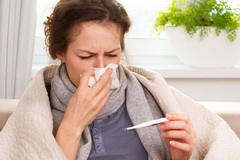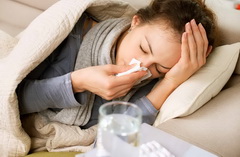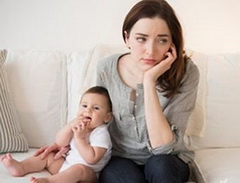Postpartum alternative chill and fever:an introduction of postpartum alternative chill and fever and related syndromes.
-
 ✵Gynecology of TCM is a branch to study the physiological and pathological characteristics of women and to prevent and treat syndromes specific to women. Gynecology of TCM research scope including irregular menstruation, amenia, metrorrhagia, infertility, postpartum syndromes, breast syndromes, and miscellaneous syndromes, etc.
✵Gynecology of TCM is a branch to study the physiological and pathological characteristics of women and to prevent and treat syndromes specific to women. Gynecology of TCM research scope including irregular menstruation, amenia, metrorrhagia, infertility, postpartum syndromes, breast syndromes, and miscellaneous syndromes, etc.
- Postpartum alternative chill and fever, and related syndromes.
-
✵The women alternative chill and fever after childbirth, and related syndromes are introduced: postpartum alternative chill and fever, postpartum similar to Two-Yang syndrome, postpartum similar to Three-Yin syndrome, postpartum aversion to cold syndrome.
- Postpartum alternative chill and fever.
-

✵The postpartum alternative chill and fever is a syndrome of alternating chills and fever occurring following childbirth, also known as puerperal alternative chill and fever, periodical cold and periodical fever, due to various pathogenic reasons. It is also known as an alternative chill and fever after childbirth.
✧ In the TCM system, the pathogenic reasons for the puerperal alternative chill and fever normally are deficiency and weakness of Qi and blood, or deficiency hurt of spleen and stomach, imbalance of Yin and Yang, residue blood not dissipating, deficiency in blood and Qi, Yang success lead to heat, Yang and Yin alternating, lead to periodical cold and fever, or Zang and Fu-viscera got hurt from consumption, weakness of blood and residue blood not dissipating, enter into the lung and heat, or enter into the spleen and cold, normally it is a syndrome of insufficiency type. If misdiagnosed as a malaria syndrome, it is a mistake.
✧Ancient herbalists who hold a syndrome differentiation viewpoint with similar explain of pathogenic reasons, and the relevant representative work are introduced and quoted:
"Alternative chills and fever after childbirth, due to deficiency of Qi and blood, or due to deficiency of spleen and stomach, is a syndrome of insufficiency. As ancient classical book Nei Jing(the Inner Cannon) said: 'Yin deficiency then fever, Yang deficiency then aversion to cold.' " [02].
✵The postpartum alternative chill and fever common types are known including:"The case that a woman suffers from alternative chills and fever after childbirth, the Cunkou pulse is weak, it is the syndrome of Yang Qi deficiency, Yin Qi going upward and entering into Yang, and aversion to cold..." [02].
"Case a woman suffers from alternative chills and fever after childbirth, chi pulse is weak, it is the syndrome of Yin Qi deficiency, Yang Qi collapse and going downward to Yin then fever..." [02].
"In general, Yin insufficiency, Yang going and following Yin, then Yang collapse internally and fever; Yang insufficiency, Yin going and following Yang, then Yin going upward and aversion to cold. In this condition that Yin and Yang are not returning to its phase, Yin and Yang struggling and fight, as a result, aversion to cold and fever..." [02].
"In case of fever in limbs after disease or tiredness in shape and Qi, it is the condition of Primordial Qi not recovered and affected again by dampness and heat..." [02].
"In case heat in muscle and great thirst, drink out cups of water, red in eyes and red flashing(red face), it is the condition of blood deficiency fever, ...should not be identified as a cold syndrome." [02]."A woman suffers from alternative chills and fever after childbirth, affect every day regularly, symptoms are similar to malaria, should not use recipes for malaria. For Qi and blood are in a deficient state, chills and fever alternating, primordial Qi weakness and invasion of the exogenous pathogen, although cold to chilling, the soup and fire could not get warm, heat as burning charcoal, ice water could not let it cool down, or it is mild in the day time and severe at night, or chills and fever in the late afternoon, although its symptoms are similar to malaria, the treatment should nourish Ying and benefit Qi, to eliminate chills and fever..." [03].
"In case a woman suffers from alternative chills and fever after childbirth, sweating on heat but not to feet, it is a dangerous condition of solitary Yang and solitary Yin...
In case a woman suffers from alternative chills and fever after childbirth, affected by cold, cephalea(headache, pain in heat) but not sweating..." [03]."A woman suffers from alternative chills and fever after childbirth, what is it? It is due to blood deficiency and affection of cold, pain in limbs(hands and arms, feet and legs), dizziness and vertigo..."
“A woman suffers from malaria(alternative chills and fever) after childbirth, what is it? It is due to hurt from the diet, food stagnancy, and generates phlegm...” [04]."Chills and fever:...all due to strain and consumption hurt the Qi and blood, Yin-Yang disorder, alternative chills and fever similar to malaria, should differentiate it as deficiency or excess of Qi and blood." [05].There are different types of chills and fever syndrome:⑴. In the case the Cunkou-pulse is weak, it is the condition of Yang insufficiency type, Yin going upward to the Yang;⑵. In the case chi-pulse is weak, it is the condition of Yin insufficiency type, Yang going downward to the Yin;⑶. In the case of Qi and blood are both deficient; ⑷. In case the liver fire is motivated by anger, etc.
"Chills and fever: a woman suffers from alternative chills and fever after childbirth, irritable pain in joints, cephalea and spontaneous sweating(spontaneous perspiration), lassitude and general fatigue, cough and phlegm reverse flow, colic pain in the abdomen...; other symptoms are spleen deficiency and Qi weakness, cough with dry mouth..." [06].
"Sudden chills and sudden fever after childbirth: a woman suffers from alternative chills and fever, it is similar to malaria, what is it? Residue blood not passing completely, imbalance of Yin and Yang, all lead to cold and fever, how to differentiate? In the case due to residue blood, ..." [06].Different types are introduced:
⑴.A woman suffers from sudden chills and sudden fever after childbirth, due to residue blood not passing down completely, blocking the meridian and collaterals, obstruction of the Ying and Wei system...
⑵.A woman suffers from sudden chills and sudden fever after childbirth, due to imbalance of Yin and Yang, deficiency of Qi and blood, deficiency of Yin and Yang, ... Yin and Yang are both deficient then sudden chills and sudden fever, ... In case cold is more than fever, ... In case fever is more and cold, ... In case dysphoria(irritable vexation and thirst), ... In case of poor appetite, ... In case lassitude and fatigue. "Chills and fever after childbirth:... A woman suffers from chills first and fever later, or fever first then chills later, alternative and there is a regular period, it is the syndrome of malaria, mostly due to blood stasis and food retention...; In case there is no regular period(of the chills and fever), it is the syndrome of Qi and blood deficiency and hurt, the disorder of the Ying and Wei system, Yin and Yang are in domination in turns..." [07].
"Chills and fever after childbirth:... A woman suffers from chills first and fever later, or fever first then chills later, alternative and there is a regular period, it is the syndrome of malaria, mostly due to blood stasis and food retention...; In case there is no regular period(of the chills and fever), it is the syndrome of Qi and blood deficiency and hurt, the disorder of the Ying and Wei system, Yin and Yang are in domination in turns..." [07].
- Postpartum similar to Two-Yang syndrome.
-

✵The postpartum similar to Two-Yang syndrome normally affects in seven days after childbirth, or over seven days, it is a syndrome of fever with cephalea and aversion to cold, not definitely is Tai Yang syndrome; or a syndrome of fever with cephalea and pain in hypochondria, not definitely is Shao Yang syndrome. Because the symptoms of fever with headache and aversion to cold are normally observed in Tai Yang syndrome, and the symptoms of fever with cephalea and pain in hypochondria are normally observed in Shao Yang syndrome, thus, these two syndromes with similar symptoms of Tai Yang or Shao Yang syndrome normally affect in seven days or over seven days after childbirth, are not definitely is identified as classical Tai Yang syndrome or Shao Yang syndrome.
✧In the TCM system, the pathogenic reasons for the postpartum similar to Two-Yang syndrome normally are deficiency of Qi and blood, imbalance of Yin and Yang(a disorder of Yin and Yang), it is a syndrome of insufficiency type.
✧Ancient herbalists who hold a syndrome differentiation viewpoint with similar explain of pathogenic reasons, and the relevant representative work are introduced and quoted:"After childbirth, in seven days or over seven days, case a woman suffers from fever headache and aversion to cold, not definitely is Tai Yang syndrome; case fever headache and pain in hypochondria, not definitely is Shao Yang syndrome. These two syndromes are all due to deficiency of Qi and blood, Yin and Yang are not in harmony, and similar to the syndrome by exogenous affection...; For the woman after childbirth lost blood, and re-induce perspiration, then the bad results from deficiency and deficiency, could not be presented in short sentences. ZhongJing ever said: 'For the case loss of blood, should not induce perspiration.' Danxi ever said: 'For the case after childbirth, should not relieve the exterior'..." [03].
"Case in three days(or seven days) after childbirth, a woman suffers from fever, cephalea(headache).
Case in three days(or seven days) after childbirth, a woman suffers from fever, cephalea(headache) as the head will be broken." [03].
- Postpartum similar to Three-Yin syndrome.
-

✵The postpartum similar to Three-Yin syndrome normally affect after childbirth, it is a syndrome of hot flash with perspiration, difficulty in defecation(constipation) not must be Yang Ming syndrome; or a syndrome of dry mouth dry throat and thirst, not must be Shao Yin syndrome, or a syndrome of body liquid in abdomen dry and defecation excess, not must be Tai Yin syndrome. Because the symptoms dry mouth dry throat and thirst are normally observed in Shao Yin syndrome, and the symptoms dryness and defecation excess(dry stool in the stomach) are normally observed in Tai Yin syndrome, thus, these syndromes with similar symptoms to Shao Yin or Tai Yin syndrome normally affect after childbirth, are not must be identified as classical Shao Yin syndrome or Tai Yin syndrome, or Yang Ming syndrome.
✧In the TCM system, the pathogenic reasons for the postpartum similar to Three-Yin syndrome normally are strain and tiredness hurt the spleen, the transforming and transporting function are slow and delayed, exhaustion of Qi and blood, dryness in the intestine viscus, it is a syndrome of deficiency in fact but similar to an excess syndrome, should use tonification method.
✧Ancient herbalists who hold a syndrome differentiation viewpoint with similar explain of pathogenic reasons, and the relevant representative work are introduced and quoted:"Case hot flash(hectic fever) with sweating after childbirth, difficulty in defecation(constipation), not must be Yang Ming syndrome; Case dry mouth dry throat and thirst, not must be Shao Yin syndrome; Case liquid in abdomen dryness, defecation excess, not must be Tai Yin syndrome; Case sweating and wild talk with constipation, not definitely there are dry feces stagnant in the stomach and need to use purgation method. These syndromes are mostly due to strain tiredness and spleen hurt, transforming and transporting function slows down, exhaustion of Qi and blood, dryness in intestine viscus, are deficiency syndromes actually but similar to an excess syndrome, should use tonification method." [03].
"Case after childbirth, a woman suffers from sweating, difficulty in defecation(constipation).
Case after childbirth, a woman suffers from dry mouth dry throat and thirst;
Case after childbirth, a woman suffers from liquid in abdomen dry, defecation excess(constipation, difficulty in defecation);
Case after childbirth, a woman suffers from sweating and wild talk, constipation." [03].
- Postpartum aversion to cold.
-

✵Postpartum aversion to cold syndrome normally affects after childbirth, it affects in other periods too, it is a syndrome with symptoms aversion to cold for various reasons, the major reasons are Yin or Yang. Except after childbirth, the aversion to cold syndrome also affects in other periods.
✧In the TCM system, the pathogenic reasons for the postpartum aversion to the cold syndrome normally are cold pathogen entering into the abdomen, hurt from strain, hurt from diet and drink, etc. In case fever and aversion to cold, affection from Yang, the pulse is floating and rapid; In case no fever and aversion to cold, affection from Yin, the pulse is sinking and fine.
✧Ancient herbalists who hold a syndrome differentiation viewpoint with similar explain of pathogenic reasons, and the relevant representative work are introduced and quoted:"A woman suffers from aversion to cold, there are Yin and Yang syndromes. Fever and aversion to cold, affection from Yang, No fever and aversion to cold, affection from Yin...; In the case of a cold pathogen entering the abdomen, accumulation in the blood chamber, it is very difficult to treat." [05]. The common types of aversion to cold are introduced:
⑴.Aversion to cold of Yang syndrome: fever and aversion to cold(fear coldness), the pulse is floating and rapid;
⑵.Aversion to cold of Yin syndrome: no fever and aversion to cold(fear coldness), the pulse is sinking and fine;
⑶.Aversion to cold of Yang inhibited type: lassitude and tiredness, prefer to sleep, chills and aversion to cold, it is the case aversion to cold of Yang inhibited type.
⑷.Aversion to cold of strain type: strain hurt the physical constitution and Qi, aversion to cold, the Wei system lost support from Yang, it is the case aversion to cold of strain type.
⑸.Aversion to cold of diet hurt: diet and drink(excessive food drink, cold food drink, or improper food drink) hurt the stomach and spleen, aversion to cold, is the case aversion to cold of diet hurt type, the primordial Qi is deficient and hurt. Other symptoms might be observed are: vexation and wild talk, want to drink water; or lassitude and polydypsia(vexation, thirst), cephalea and spontaneous perspiration(headache or pain in head, spontaneous or involuntary sweating);
⑹.Aversion to cold in the day time: aversion to cold and fever in the day time, is the case Yin Qi flow upward to Yang-phase;
⑺.Aversion to cold at night: aversion to cold at night, is the case Yin-blood turn excess in the Yin-phase.
⑻.Aversion to cold of phlegm type: aversion to cold in chronic disease, normally due to phlegm stagnant in the spleen, inhibit Yang from outflowing, is the case aversion to cold of phlegm type."Chills and Fever after childbirth: a woman suffers from aversion to cold and fever, is a syndrome of exogenous affection(aversion to cold, also fever, not in an early or later order)..." [07].
References:
-
- 01.Postpartum alternative chill and fever:an introduction of postpartum alternative chill and fever and related syndromes.
- 02.Nǚ Ke Cuo Yao(the Synopsis of Gynaecology).By 薛己(Xuē Jǐ)[Ming].
- 03.Jiēzhāi Gōng Tāi Chǎn Yī àn(Births Cases of Jie Zhai Gong).By 王纶(Wáng Guān)[Ming].
- 04.Fù Kē Bǎi Biàn(the Differentiations in Hundred Syndromes of Gynaecology).By 庄履严(Zhuāng Lǚyán)[Ming].
- 05.Nǚ Ke Bǎi Xiào Quán Shū(the Efficacious Complete Book of Gynaecology).By 龚居中(Gōng Jūzhōng)[Ming,1630].
- 06.Fù Kē Bèi Kǎo(the References of Gynaecology).By 何应豫(Hé Yīngyù)[1820].
- 07.Fù Kē Liáng Fāng(the Effective Prescription of Gynecology).By 何梦瑶(Hé Mèngyáo)[1751].
